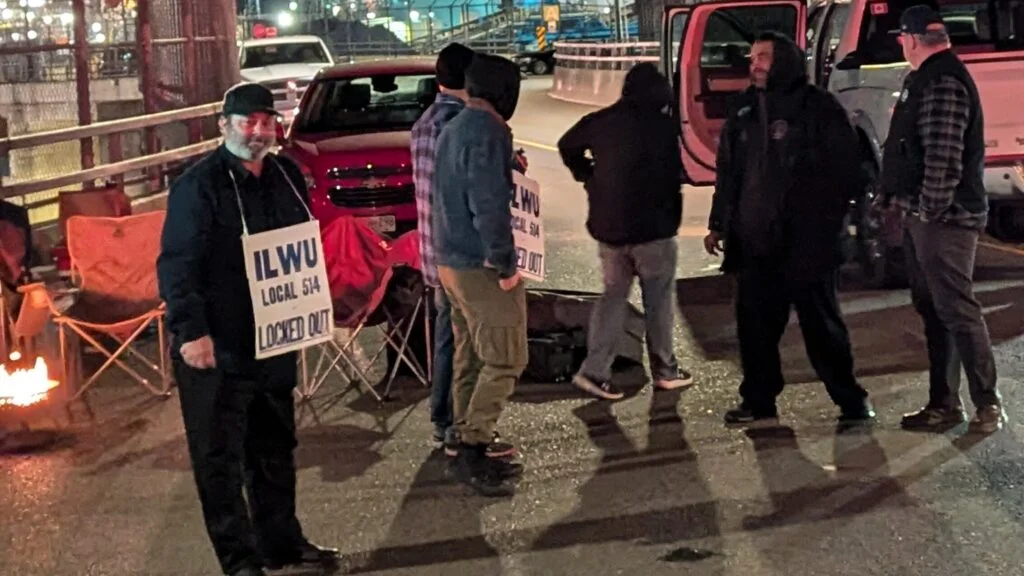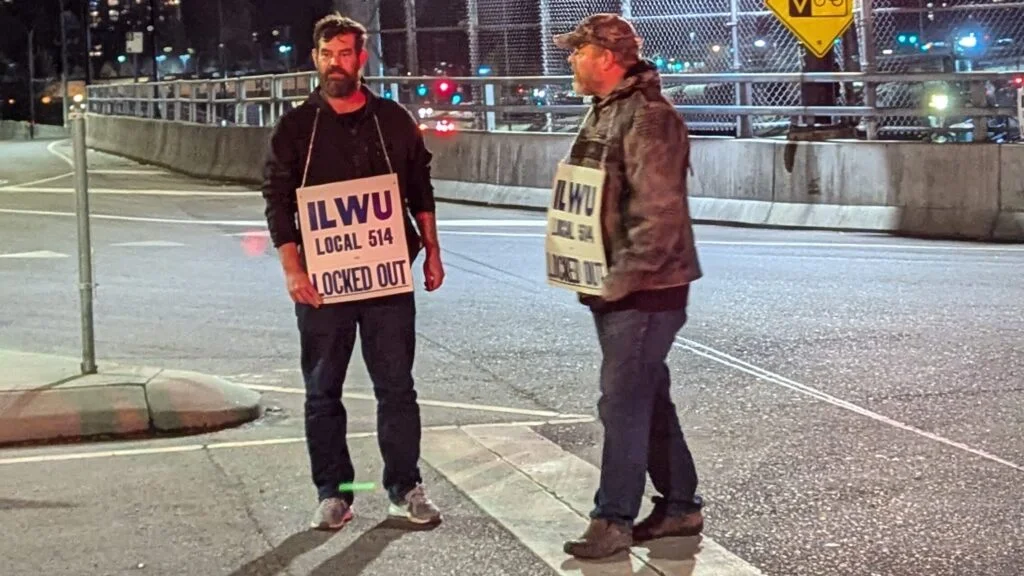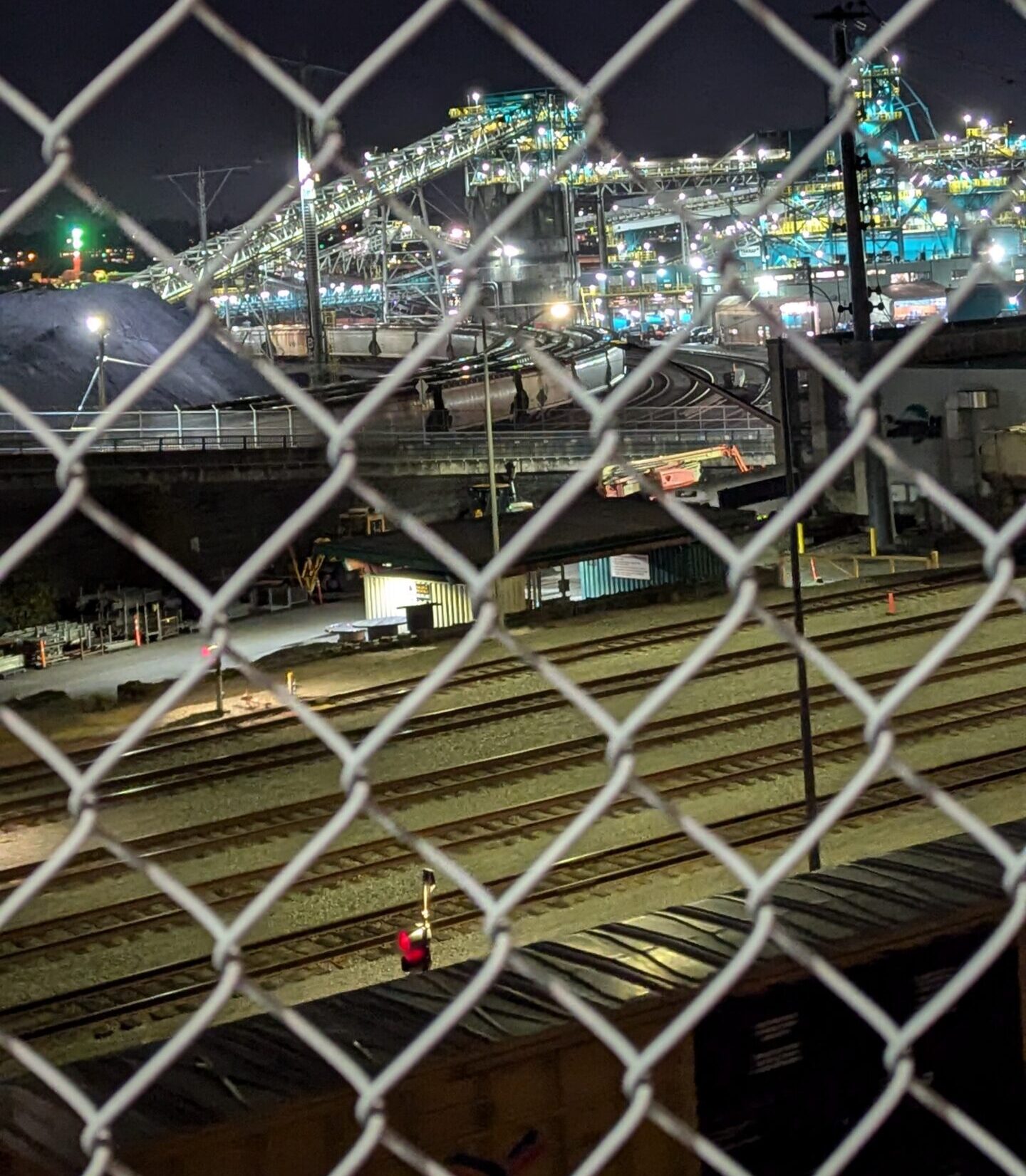The BC Maritime Employers Association (BCMEA) has locked out unionized foremen, shutting down ports in Vancouver, Prince Rupert and across the province on the evening of November 4. The action, which the employer is calling a “defensive lockout,” comes after the port foremen’s union implemented an overtime ban on the morning of November 4 as the first step in a planned escalating job action.
The contract for ILWU Local 514, which represents the port forement, expired on March 31, 2023. Talks, including mediation efforts, have failed to yield a new agreement. The BCMEA has accused the union of bargaining in “bad faith.” The union said in an October 31 press release that “the BCMEA and its members clearly don’t want to reach an agreement even when federal mediators and the unions are standing by to continue talks.”
For insight into the issues behind this lockout, The North Star interviewed John-Henry Harter, Labour Studies and History lecturer at Simon Fraser University. For Harter, “the biggest issue that the employer doesn’t want to talk about, is automation. And that was a big issue in the summer of 2023 [when port workers in B.C. struck] as well.”
“When you read the BCMEA’s press releases and stuff like that, they really highlight how well these workers are paid and what a great offer they’ve made, you will not really see much about automation. And the union’s really pointed it out well, saying: how well our members are paid doesn’t really matter when they are automated out of a job.”

Port automation has been an issue in port strikes across the continent in the past couple of years and is being adopted by port operators in a big way. A 2018 report published by McKinsey & Company, entitled “The Future of Automated Ports,” argued that automation could reduce operating expenses by 25 to 55 percent and increase productivity 10 to 35 percent.
Corporate think-tanks like McKinsey characterize automation as necessary and inevitable, a sentiment often echoed by employers and in the mainstream media.
Harter says, “If big employers, capitalists, decide to replace their workers with machines, that’s a choice that they’re making. There’s no inevitability about this. It really bothers me when people frame this as, ‘We must accept losing our jobs to automation,’ frame it as inevitable, instead of a deliberate choice by capitalists to maximize their profits.”
Harter points out that just members of the BCMEA, huge global corporations including Maersk, Cosco and Hapag-Lloyd, made $100 billion in profits in 2022.
“It really [shows] that the economy isn’t for us. They try to convince us that our interest as workers, as the working class, is the same as these billionaires. Like, who cares how much profit the BCMEA makes?”

In the day that the BCMEA locked out its workers, business organizations including the Greater Vancouver Chamber of Commerce, the Canadian Federation of Independent Business, and the Canadian Manufacturers and Exporters called for the federal government to intervene in the labour dispute. This is a trend that Harter finds troubling.
“They are the ones causing this disruption, and all the business groups are gonna be saying, ‘The supply chain, it’s gonna cost Canadians X number of million dollars a day,’ as if it isn’t the BCMEA, the employers, causing this disruption.”
Following the 2023 ILWU strike, the BCMEA asserted that such a disruption should never happen again. “I think it lays out that they’ll say anything and do anything to make sure that they have an even more profitable year than 2022, when they made over $100 billion,” commenter Harter.
Harter notes that calls for essential services designation and government intervention have increased in recent years.
“It has been common for the last 50 years, but it has increased. In the 2023 ILWU strike, I pointed out that, in The Globe and Mail, even before the strike started, when [the union] had just issued their 72-hour strike notice, there was already a call in an op-ed calling on the federal government to intervene.”
“I’d never seen that before,” he adds. “But what we are seeing is that as soon as a union notifies that it may go on strike, we’re seeing calls to order them back to work, calls to intervene are coming from the employer and all their allies.”
“And I would argue that, since the right to collective bargaining was upheld in 2007 by the Supreme Court, and the right to strike in 2015, employers are going out of their way to attack our right to collectively bargain and our right to strike.”

